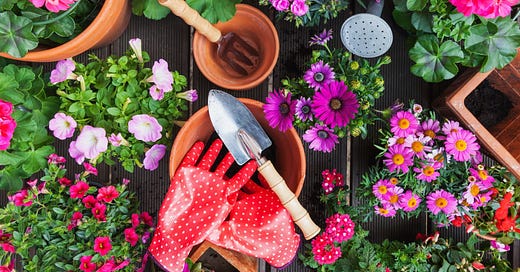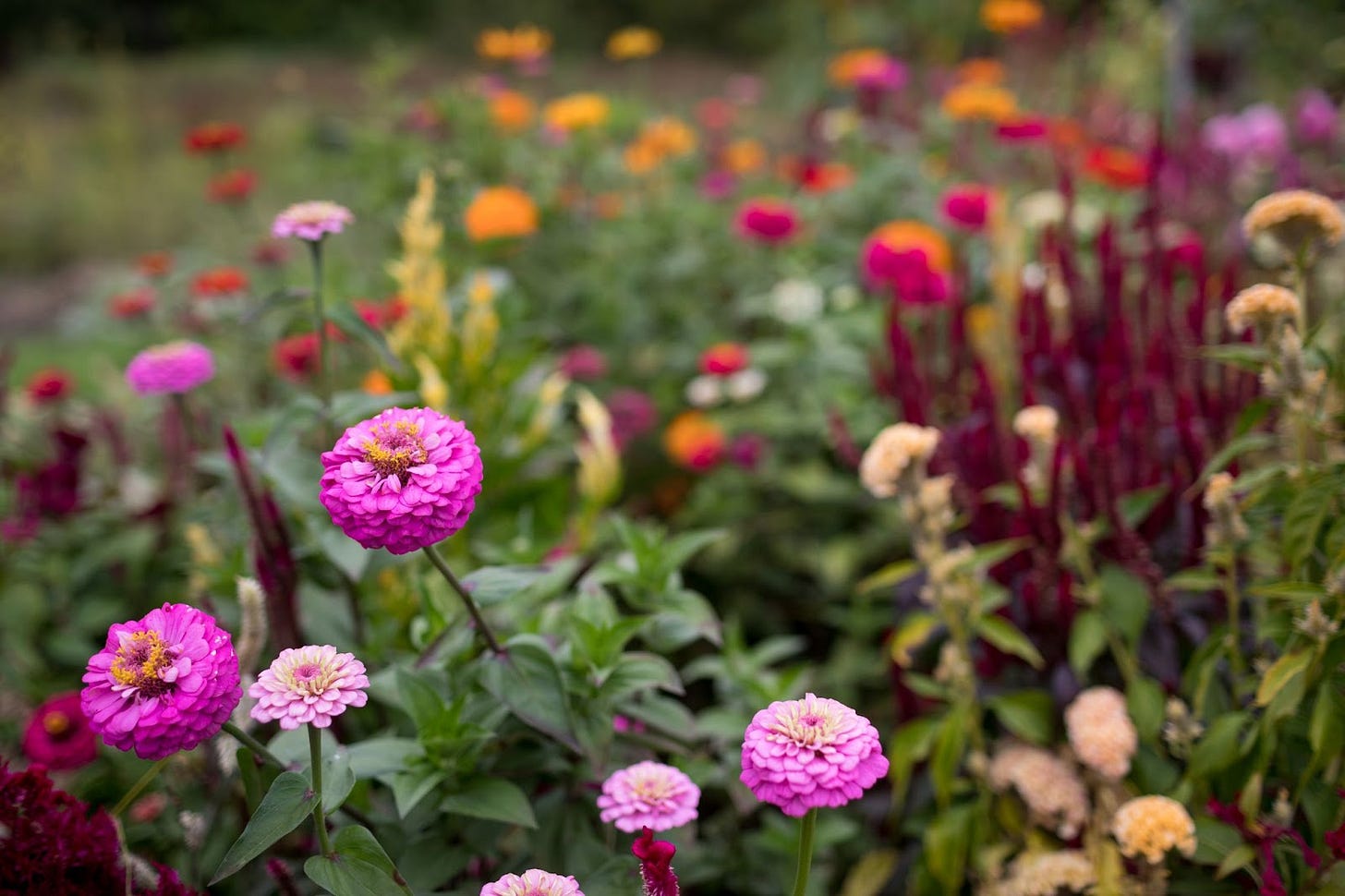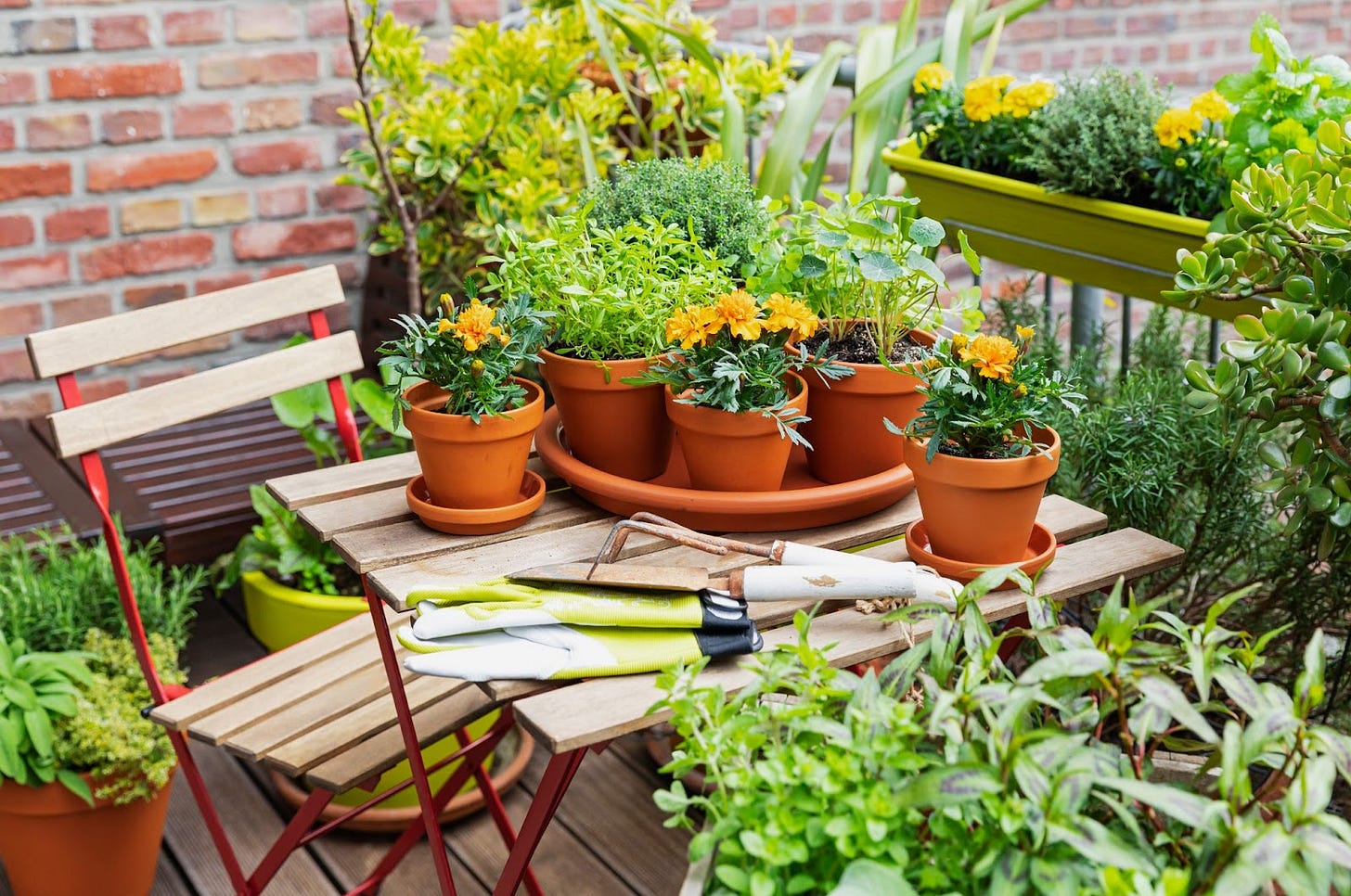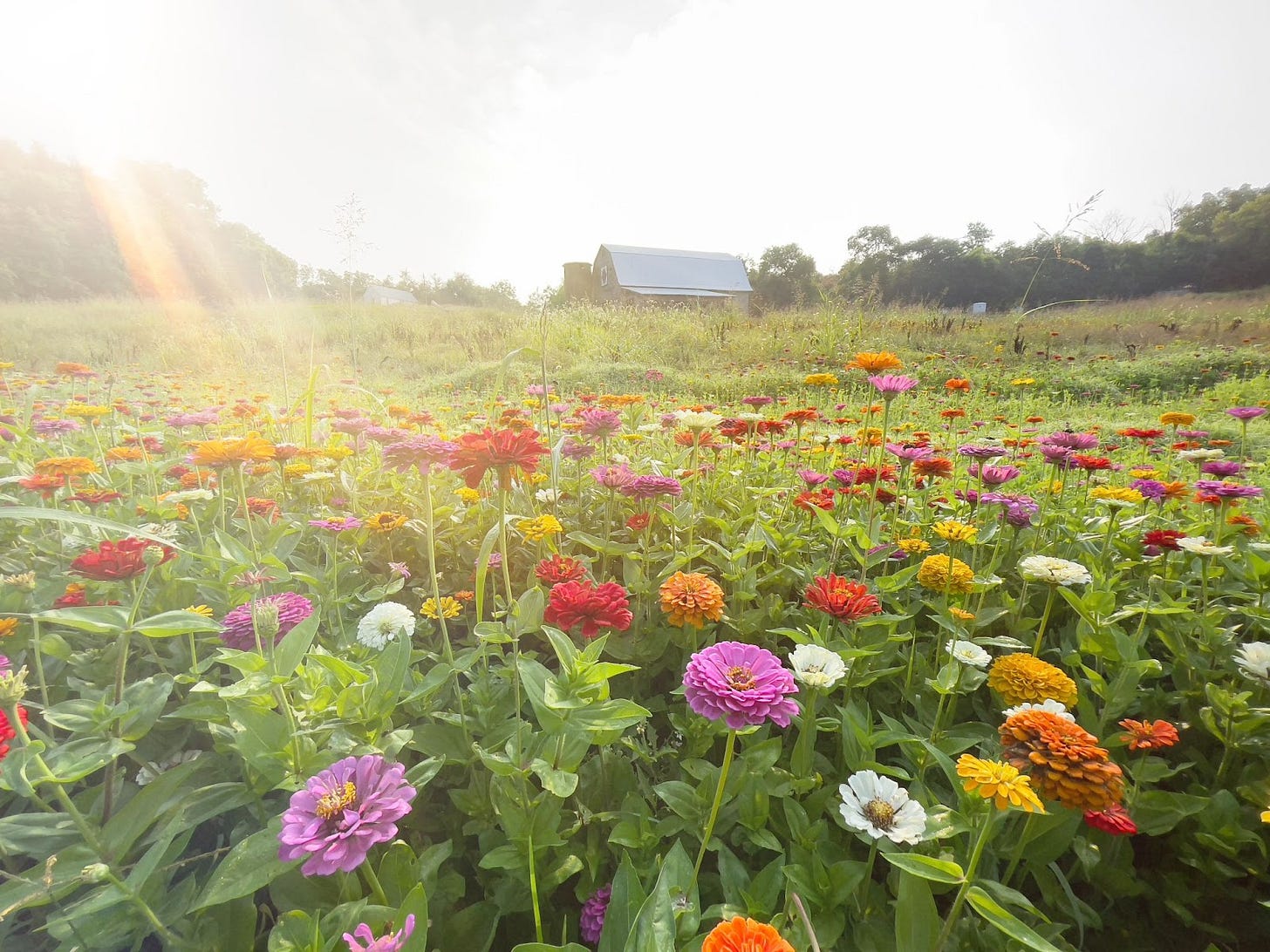2024 is going to be a tough year. That’s the collective vibe, isn’t it? The unspoken assumption that we all share. It feels like we’re all holding our breath, trying to appreciate the calm before the storm that is Election Day, or before the myriad tragedies and disasters that will come before that.
Of course, in many places around the world — and, perhaps, in many of our own lives — the storm has arrived. 2024 is already a tough year, as was 2023 and the years before that.
The question is not whether 2024 will be a challenging year. It’s how will we rise to meet its challenges?
I’ve been asking myself that a lot lately. What can I do to brace myself, to fortify myself, to remind myself that there is good in the world at a time when the news, social media, and horrific events try to convince me otherwise?
Or, to ask the question as inspired by a recent meme: How am I planting flowers?
In the single-panel cartoon, two farmers stand in a field harvesting flowers.
“Aren’t you worried what 2024 will bring?” One beleaguered-looking farmer asks the other. “Everything is so crazy these days.”
“I think it will bring flowers,” the smiling farmer says.
“Oh really? Why?” the first farmer asks.
“Because I’m planting flowers,” the other farmer replies.
I heard people talk about Miley Cyrus’ “Flowers” before I actually listened to it. Last summer, the titular line of the song’s chorus — “I can buy myself flowers” — was everywhere. It was an anthem of empowerment and self-love.
The song is, as the kids say, a bop. When I finally did hear “Flowers,” I loved it. I blasted it and danced in the kitchen as I cooked. If my child had been older, she would surely be embarrassed. Instead, she bopped along with me.
It’s a solid anthem. But I’d like to believe that this year’s mantra is slightly different. If 2023 was about buying flowers, 2024 is about planting them. In other words, I think — and hope — that we’re beginning to shift our attention from self-care to community care. We’re considering not just ourselves, but others. We’re thinking beyond the present moment.
I spent this past weekend in the Atlanta suburbs, enjoying a makeshift retreat with two friends who are also mothers to young children. Our kiddos and partners, who made it possible for us to go away, spent the weekend together bouncing from local playgrounds to a local theatre, while we moms spent the weekend together doing a whole lot of nothing.
We read. We completed a puzzle. We read some more. We ate coffee cake for breakfast and yellow cake with chocolate icing for dessert. We talked about the things that exhaust and worry us. We relaxed and then relaxed some more. Before we returned home, we went for a hike — one last dose of nature and relaxation to fortify us for the responsibilities that lie ahead.
It was lovely. And affordable! My friend’s mom offered for us to stay at her house during our weekend away. We didn’t have to buy anything but a few groceries and a dinner out. We left feeling rejuvenated and eager to do it all over again in a few months.
At the start of this year, I made a vow that I wanted 2024 to be the year of helping others. This, like most ideas, was not purely altruistic; I knew that by helping others, I’d be helping myself — especially during times when I was feeling especially anxious or helpless. Instead of worrying, I could do something.
One way I’ve started doing this is by making lunches for the unhoused people in my neighborhood. Each week, I make 10 bagged lunches and drop them off at our nearby community closet. I’ve done this for seven weeks now, which means I’ve made 70 meals so far.
If I keep up this practice, by the end of the year I will have made more than 500 lunches — which is big and little at the same time. It’s a drop in the bucket, especially here in Atlanta where homelessness is on the rise. But it’s something. It helps a few folks each week, and it helps me. It gives my anxious mind something to do. It gives me an age-appropriate way to talk with my daughter about the haves and have-nots (when possible, she joins me in making sandwiches and putting fruit and crackers into each bag). It gives me a task that anchors my week. It’s one small way that I’m planting flowers for the year ahead.
At first glance, our weekend retreat in the suburbs seemed more akin to buying flowers than planting them. But it quickly became clear that we moms weren’t just thinking of ourselves. We were thinking of each other. We were thinking about the small community that we’ve begun to form with our children and our partners. We were thinking about how, after two nights of good sleep and days full of relaxation and conversation, we would return home, better able to care for our families.
There’s a long list of reasons why 2024 might be a difficult year. I know, because I compiled that list of reasons in a notebook as I was thinking about this essay. It was by no means a comprehensive list, but it was fuel for an anxious brain. I’m purposefully not sharing it here. Some ideas should stay in our heads.
What I should have done — what I still can do! — was to make a list of ways that I can create pockets of calm in an otherwise stormy year. Making bagged lunches is a start. Planning future weekend retreats is another. There are plenty of smaller actions I can take, too. Scheduling regular phone calls with friends. Spending time in nature — and encouraging others to join me. Writing hopeful lists and newsletter essays and letters to loved ones. Reminding others they’re not alone. Reminding myself of that, too.
Self-care, especially as it was first conceived, is a helpful and necessary means of survival. In recent years, though, as the idea has gone mainstream, self-care has become synonymous with commercialized items like fancy candles, elaborate skin-care routines, and expensive retreats. In her book Real Self-Care, Pooja Lakshmin calls these approaches “faux self-care,” arguing that they might help in the moment but “do nothing to change the circumstances in your life that led you to feel drained, energy-less, or down.”
In a recent journaling prompt,
took this a step further, exploring the idea of “toxic self-care.”These entreaties seem so innocuous on the face of it. They urge us to prioritise our good health and sanity in a world that leaves us constantly exhausted and stressed. They give us sassy, repeatable sentences to live by; things like ‘Put your own oxygen mask on first!’ and, ‘Own the room!’ You may well ask: where’s the harm?
What startles me about so many of these phases — no doubt shared by people pushed to the edge of coping — is that their solution is the same as the problem. By urging us towards an individualistic response to everyday pressures, they just pass the difficulty down the line.
Yes! Reading this felt like a sign that I’m not alone in my hopeful mantra for the year. Buying ourselves flowers might feel good in the moment, but it ultimately leaves us with a pile of dead flowers to throw away. Planting flowers, on the other hand, is an act of kindness for the future.
To be clear, I’ve enjoyed my fair share of self-care over the years. I’ve been one of those voices on the internet urging others to put themselves first. I’ve indulged in fancy candles, bubble baths, and face masks. I’ve literally bought myself flowers! I did these things because they were what I needed at the time. But they didn’t sustain me in the long run. They didn’t do much to deepen my connection to others.
May continues:
Toxic self-care keeps us trapped in the mindset of winners and losers; it tells us that our suffering can be solved by behaving like the selfish people who caused our suffering in the first place. And it fools us into thinking that a life without care is possible, if only we play our cards right. Our world is held together by the work of carers. Nothing — absolutely nothing — will change until we start to see each other’s needs as entangled with our own.
For all the space I take up in this newsletter, I’m pretty uncomfortable with the idea of taking up too much space in real life. That’s another topic for another day. I mention this now because I feel like I’m on a soapbox, and it’s a bit wobbly up here. I don’t want to make anyone feel bad for their choices, especially when those choices are rooted in showing themselves kindness. I have preached the gospel of self-care in the past, and I stand by those sermons! At this point in my life, though, I’m thinking more often about the future and my place in the world. I don’t want to dread what’s ahead; I want to fortify myself for the challenging times, to acknowledge and embrace the good times, and to help others do the same.
Self-care can be good! Community care is also good — and it’s a choice I wish we would consider more often.
Our weekend retreat in the suburbs felt like one of both self-care and community care. I think that’s why it was so restorative. It was something we did together, with the support of others. It felt like a model for the future — an affordable, accessible way to care for ourselves and our community.
The difference between buying and planting flowers is slight. But it’s important. The next time you’re considering an act of self-care, it’s worth pausing to also consider whether that kindness can extend beyond you — or beyond this moment.
Truth be told, many of the reasons we expect 2024 to be terrible are borne from the fact that we live in an individualistic society. When we think only of ourselves — when we don’t consider the wider impact of our actions — we create chaos. We ravage the fields of flowers for our own needs and leave nothing behind.
But it doesn’t have to be that way. If we stop caring only for ourselves and begin also considering the needs of others, of the ways we are all connected and rely on each other, I suspect the future will seem a lot less foreboding.
2024 will be a tough year, sure. But we always have the option to plant some seeds and help them grow. This year will be hard, but it can also bring flowers.
xoxo KHG
p.s. Props to
, who was the first person I saw to share that lovely flower meme that prompted this post. Thanks for the inspiration, Elle!








I love this analogy. Like most things, two (or seventeen) can be true at the same time: it's good to plant flowers AND buy ourselves flowers. Maybe some seasons are for buying ourselves flowers, some are for planting, and some are for a mix of both.
I do think you're spot on about the root of so much of our problems being that we are being sold that our problems are individual ones instead of system ones AND then being sold that the solutions are individual ones too. It's a big mess that keeps most of us collectively suffering because we're never getting to the root of things and blaming ourselves in the process. No wonder we're exhausted and grasping onto "faux self care!"
Katie, this was such a beautiful missive. You’ve articulated so much of where my thinking is… it feels like there’s this desire to escape into the ‘me’, when what will really see us through is sinking in to the ‘we’. I love the buying vs planting flowers analogy too! 🌸 thank you.